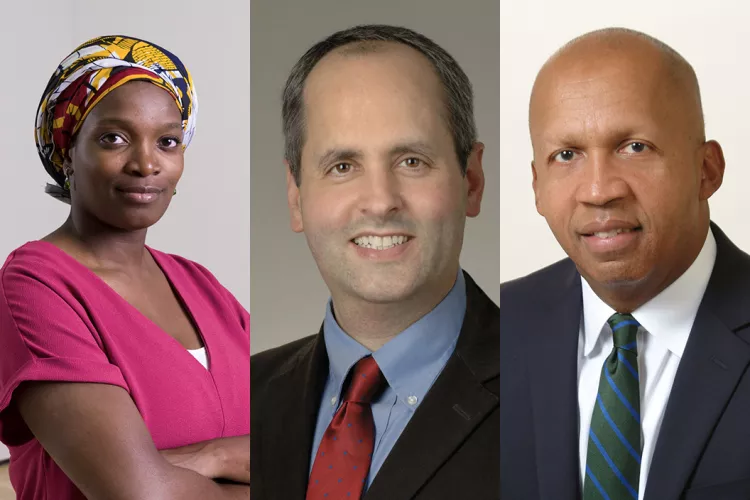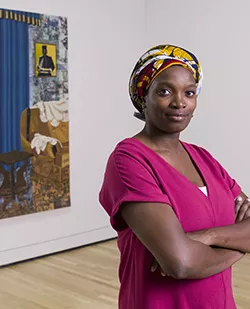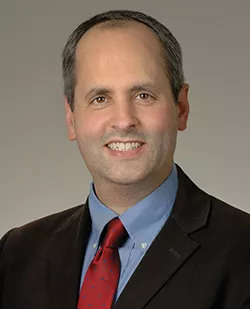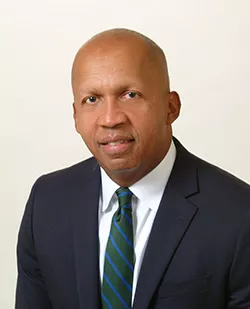Visual Artist, Biochemist, and Justice Advocate Named 2019 Honorary Degree Recipients

President Valerie Smith will award honorary degrees to visual artist Njideka Akunyili Crosby ’04, biochemist Jon Lorsch ’90, and justice advocate Bryan A. Stevenson at Swarthmore College’s 147th Commencement on May 26. In addition, approximately 410 undergraduates will receive degrees at the ceremony in Scott Amphitheater.
Njideka Akunyili Crosby ’04

Njideka Akunyili Crosby ’04 is an award-winning visual artist best known for art that reflects the cultural terrain between her adopted home in America and her native home in Nigeria.
Famed for her work combining collage, drawing, painting, printmaking, and photo transfers, her collections invite a global dialogue about social and political issues. A central characteristic of her work is the layering and collaging of small photographic images from Nigerian magazines or photos taken by Akunyili Crosby in Nigeria. She holds citizenship in both Nigeria and the United States.
For her accomplishments, Akunyili Crosby was awarded the prestigious MacArthur Foundation “Genius Grant” in 2017. In 2016, she was featured as a “Woman of the Year” by The Financial Times and awarded the Prix Canson Award for Art on Paper. She is also a past recipient of the Smithsonian American Art Museum’s James Dicke Contemporary Art Prize, as well as many other awards.
Her work can be found in major museums including Yale University Art Gallery, San Francisco Museum of Modern Art, the Pennsylvania Academy of the Fine Arts, the Studio Museum in Harlem, the Nasher Museum of Art at Duke University, Los Angeles County Museum of Art, the Whitney Museum of American Art, and Tate Modern. She has participated in artist residency programs at the Studio Museum in Harlem, the International Studio & Curatorial Program, the Bronx Museum AIM, and the Marie Walsh Sharpe Space Program.
Akunyili Crosby graduated from Swarthmore with a B.A. with honors in art and biology. After Swarthmore, she attended the Pennsylvania Academy of the Fine Arts for a certification in painting conservation and then received an MFA from the Yale School of Art. She met her husband, Justin Rust Crosby ’04, at Swarthmore.
Photo courtesy of Baltimore Museum of Art
Jon Lorsch '90

Jon Lorsch ’90 is a biochemist who uses his expertise in the field to make a difference in medical research for all.
Since 2013, Lorsch has been the director of the National Institute of General Medical Sciences (NIGMS). In this role, he oversees the multibillion-dollar budget that supports basic research, increases the understanding of biological processes, and lays the foundation for advances in disease diagnosis, treatment, and prevention. He is also known for his own research, which focuses on RNA and initiation of translation, a major step in controlling how genes are expressed. He continues this research as a tenured investigator in the National Institutes of Health (NIH) Eunice Kennedy Shriver National Institute of Child Health and Human Development.
Before joining NIGMS, Lorsch was on the faculty at Johns Hopkins University School of Medicine in the Department of Biophysics and Biophysical Chemistry. In the early 2000s, he worked to reform the curricula for graduate and medical education there and spearheaded the development of the Center for Innovation in Graduate Biomedical Education. He also initiated a program that offers summer research experiences to local high school students, many from groups underrepresented in the biomedical sciences. At Hopkins, Lorsch was the recipient of six awards for excellence in teaching.
For his accomplishments, Lorsch has been a member of the NIH Steering Committee since 2014 and has co-chaired the NIH Extramural Activities Working Group since 2014 and the NIH Scientific Data Council since 2016. As director of NIGMS, Lorsch has worked to find innovative ways to enhance the efficiency and productivity of basic biomedical research, strengthen and diversify the research workforce, and increase the scientific returns on the taxpayers’ investments. He has authored more than 70 peer-reviewed research articles, book chapters, and other papers; edited six volumes of Methods in Enzymology; and received two U.S. patents.
Lorsch graduated from Swarthmore with a B.A. with honors in chemistry. He received a Ph.D. in biochemistry from Harvard University and a postdoctoral fellowship in biochemistry from Stanford University. While at Swarthmore, he was inducted to Phi Beta Kappa and Sigma Xi. He received the Stanley Adamson Prize in Chemistry and the American Chemical Society Scholastic Achievement Award. Lorsch has returned to campus to present two talks and has served as an honors examiner on several occasions.
Photo courtesy of NIGMS
Bryan A. Stevenson

Bryan A. Stevenson is the founder and executive director of the Equal Justice Initiative (EJI), where he has won national acclaim for his work challenging bias against the poor and people of color in the criminal justice system.
Stevenson authored Just Mercy: A Story of Justice and Redemption, which was named by Time magazine as one of the “10 Best Books of Nonfiction” for 2014. He won the 2015 Andrew Carnegie Medal for Excellence in Nonfiction. He has published widely disseminated manuals on capital litigation and written extensively on criminal justice, capital punishment, and civil rights issues. In 2012, he argued before the Supreme Court and won a landmark ruling banning mandatory life without parole sentences for minors.
In April 2018, Stevenson and the Equal Justice Initiative opened a widely praised museum, The Legacy Museum: From Enslavement to Mass Incarceration, and memorial, The National Memorial for Peace and Justice, in Montgomery, Ala., exploring the legacy of slavery, racial terrorism, segregation, and contemporary issues of mass incarceration, excessive punishment, and police violence. The Washington Post hailed it as “one of the most powerful and effective new memorials in a generation.”
Stevenson has received numerous honorary degrees, including from Harvard, Yale, Oxford, and Princeton. He was the recipient of the American Bar Association's (ABA) highest honor, the ABA Medal, in 2018; the Dayton Literary Peace Prize; and a 1995 MacArthur Fellowship Award.
Stevenson graduated from Harvard Law School and the Harvard School of Government in 1985. During his career, he has secured relief for dozens of condemned prisoners, advocated for poor people, and developed community-based reform litigation aimed at improving the administration of criminal justice.
In March 2017, Stevenson delivered a public lecture at Swarthmore that was co-sponsored by the President’s Office, the Lang Center for Civic & Social Responsibility, and the Department of Political Science addressing issues such as mass incarceration, punishment, race, and justice in the U.S.
Photo courtesy of Paul Robertson



